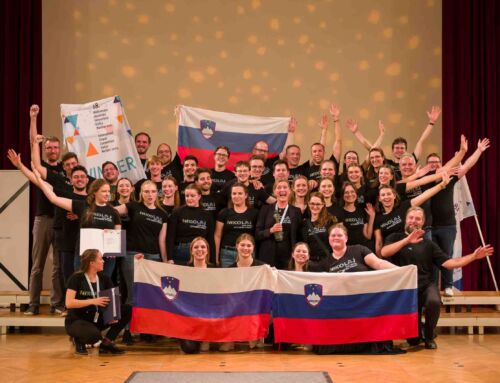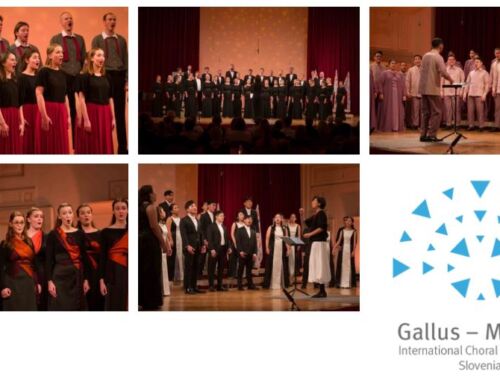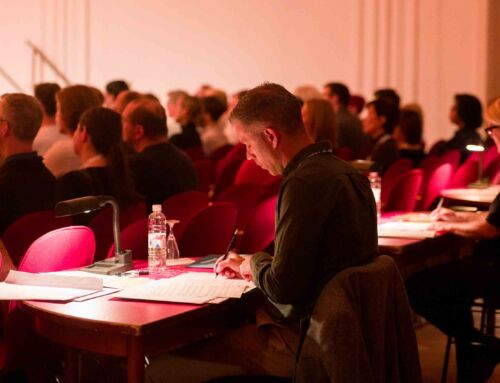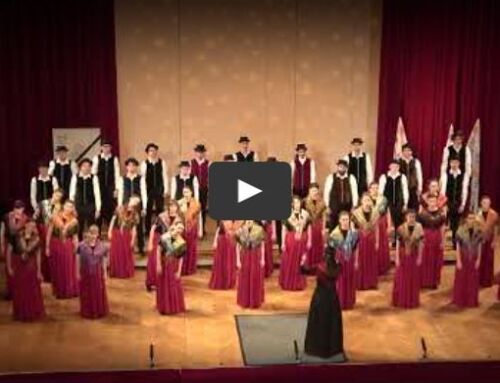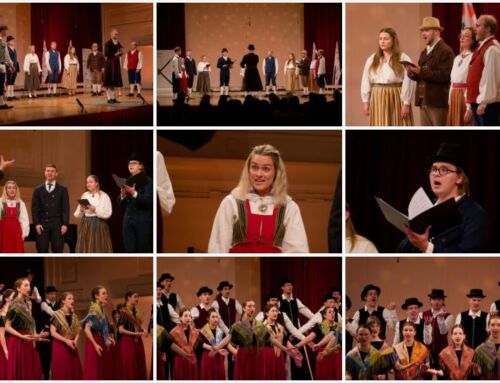Speech of the President of the Jury Karmina Šilec at the Closing Ceremony of the International Choir Competition Gallus – Maribor 2025
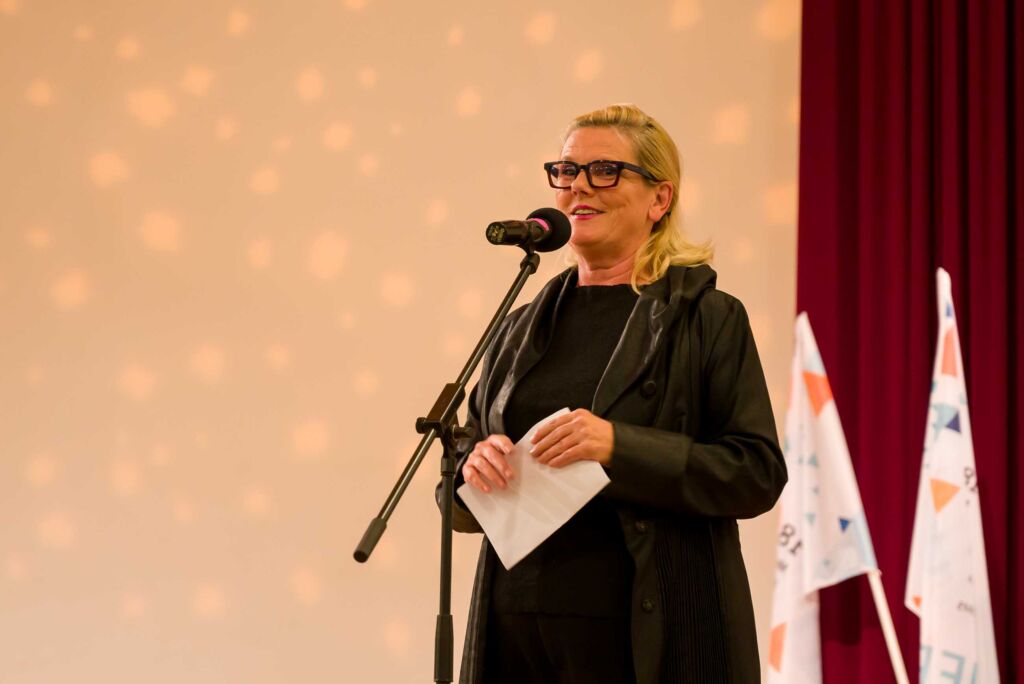
A village in Sumatra during WW2. Women of various nationalities have been interned without explanation: The Dutch, British, Irish, Portuguese, Chinese, Australian … Twenty nationalities of all social classes are forced to bow to the Japanese flag. The internees are coping with torture, hard work, sickness and expanding death ─ typhoid fever, malaria, lice, hunger and unbearable heat kill over one third of them.
In the barrack 9, with the purpose of encouraging the internees, musician and missionary establish a vocal orchestra. They fear for their lives according to a strict prohibition of any gatherings, social as well as religious. The vocal orchestra rehearses secretly in the kitchen, at night. The music brings motivation and hope although the number of singers steadily decreases.
But internees get charmed by long loved music which is bringing out powerful memories. Their thoughts fly away from isolation, hunger, fear, loneliness and smelly dirt, they recollect peace, order, beauty and joy of their “previous” lives. The survivors testify there were three things that helped them survive ─ love of God, sunrises and sunsets, and the transcendent singing of the vocal orchestra.
This tells us about the complex relation between music, trauma, mourning and legacy and of music as a universal symbol in suffering and the ultimate sanctuary in despair. Music has the power to overwhelm all senses, one’s body and soul, to shift the tormented to some other world. It can possibly rule over death.
This short story is a testimony of human ability to survive, to persevere, to show solidarity, and to create music. It is a reminder of the extraordinary legacy of determination and resilience in the horrific conditions of the camp in Sumatra, as well as in other war camps to this day. Today, they sing in camps in Syria, Palestine, Jordan, Uganda, Kenya…
Stories like this remind us of the power of music.
Gallus – Maribor is not just a competition – it is a place that reminds us of the value of peace, which we often take for granted. Peace means more than the absence of war; peace allows music to resonate, culture to flourish, and communities to connect.
Dear choir conductors, singers, and esteemed guests,
I am delighted to welcome you as the chair of the jury at this year’s Gallus Maribor International Choir Competition. For many years, this competition has been a place where different musical expressions and traditions come together.
In addition to the artistic value of the competition performances, I would like to highlight the social significance of choral music. In today’s world, which is undergoing rapid technological and political change, choral music remains a powerful expression of community, cooperation, and mutual respect. The Gallus Maribor competition therefore reminds us that art is a means of promoting understanding, tolerance, and cooperation.
Over the past few days, we have listened to numerous performances, assessing their technical perfection as well as their interpretation, expressiveness, and team coordination. We also paid special attention to the choice of repertoire, as each choir’s repertoire reflects its musical style, maturity, and ability to interpret different musical periods. The jury is aware that choral singing is more than just performing notes—it is about conveying ideas, feelings, and culture through the voice. We would like to highlight a few aspects that impressed us:
On behalf of the jury, I wish to extend our warmest congratulations to all choirs for their outstanding musical presentations and inspired interpretations across a wide range of genres. The standard of this year’s competition was exceptionally high, and every ensemble is to be commended for their artistry, discipline, and ability to move and uplift audiences.
As we all continue to refine our craft, the jury would like to offer a few general reflections and areas for continued growth:*
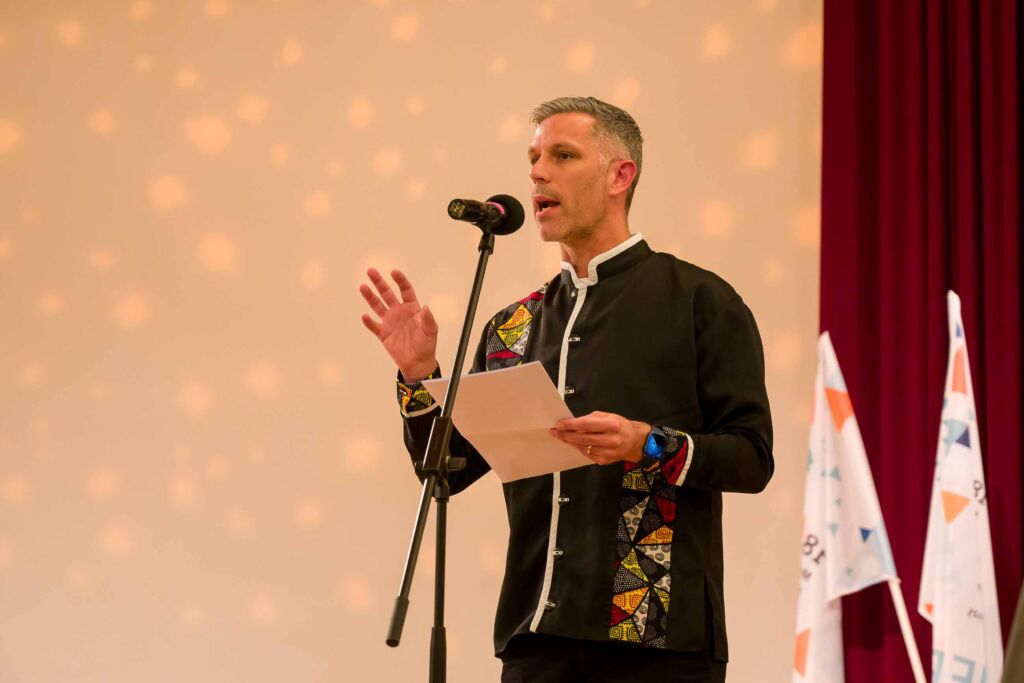
As we all continue to refine our craft, the jury would like to offer a few general reflections and areas for continued growth:
1. Repertoire Selection
The choice of repertoire within a programme is of paramount importance. It requires a delicate balance – variety in language, texture, colour, and level of difficulty – while remaining true to the strengths of your ensemble. A thoughtfully chosen programme not only highlights what you do best but also challenges the choir to develop as a more versatile and expressive vocal instrument.
2. Adapting to Acoustics
Sensitivity to the acoustics of each performance space is essential to delivering your best sound. Few choirs tended to oversing; we missed expressive piano singing. The most compelling performances are those that respond to the space and allow the music to breathe naturally within it.
3. Stylistic Understanding
We encourage all choirs and conductors to continue researching and deepening their understanding of stylistic conventions from different musical periods. Some ensembles showed exceptional insight into early choral repertoire, while others excelled in Romantic and contemporary styles. A deep awareness of the historical and cultural context of each work is vital to an authentic and informed interpretation.
4. Exploration of Vocal Colour
Choirs are encouraged to experiment more boldly with sound colour—not only between pieces, but within each composition, within voice parts, and even between phrases. Use tonal colour as a storytelling tool. The broader and more imaginative your palette, the more compelling and emotionally resonant your musical narrative will be.
5. Nuance and Expressive Detail
Nuance is at the heart of extraordinary choral singing. This includes the shaping of every syllable, the expressive use of silence, and the subtle tension that draws listeners into the unfolding story. The finest performances possess a sense of wonder and inevitability that make the audience wish the journey would never end.
Many choirs achieved these ideals with remarkable success, and the jury extends its heartfelt admiration and thanks for your artistry and inspiration. You have reminded us all of the transformative power of choral music.
I would like to thank all the performers for their dedication and willingness to share their music. Regardless of the final result, your performance is proof of your hard work, discipline, and love of music.
I would also like to thank the organizers, the technical team, and everyone who made this competition possible. Together, we maintain the high standards and international reputation of Gallus Maribor.
Karmina Šilec
___________________
* The text, written in upright type, is jury members opininon, collected by Michael Barret.

